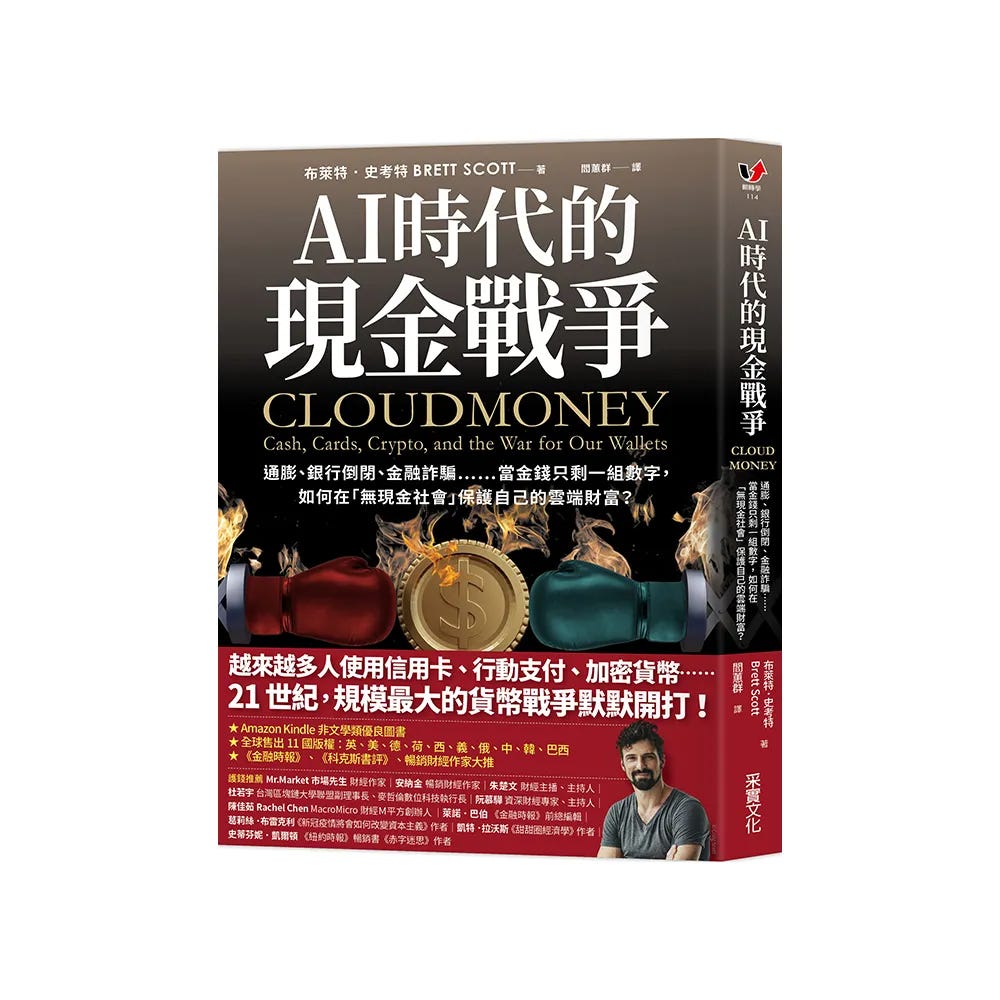GM,
Next week, I will be taking a break from publishing two episodes of the "Blocktrend" podcast, and we will resume our regular schedule the following week. Now, let's delve into the main topic.
In each episode of the "Blocktrend" podcast, the opening sponsor's advertisement always introduces a term not commonly heard in daily life, known as "financial freedom." Unlike the familiar concept of financial independence, which revolves around the quantity of money, financial freedom emphasizes the ability to spend money according to one's own will.
"But wait, isn't the money in my hands? Whose will am I supposed to follow in spending it?" For many, the notion of financial freedom may seem puzzling. Without realizing where they lack freedom, there is no motivation to pursue change. It's like patients lacking self-awareness about their illnesses; naturally, they wouldn't actively seek treatment. Recently, I came across a new book titled "Cash War in the AI Era," authored by Brett Scott, which aims to raise awareness about the "lack of awareness" surrounding a cashless society. The book also explores whether cryptocurrencies and CBDCs (Central Bank Digital Currencies) could provide a new remedy for this "ailment."
My apologies for the misinterpretation. The original book title is "Cloudmoney: Cash, Cards, Crypto, and the War for Our Wallets." The author discusses the negative impacts and coping strategies brought about by the gradual digitization and cloudification of money due to advancements in technology. This book happens to address people's skepticism towards blockchain, cryptocurrencies, and even CBDCs—questioning why some individuals want to "reinvent the wheel" when the traditional banking system appears to be well-established.
The Cost of Efficiency
Brett Scott grew up in South Africa, with both of his parents hailing from Zimbabwe. The following screenshot displays recent news related to Zimbabwe from Google. The relationship between the local people and the government is confrontational. The government hopes that people will use the Zimbabwean dollar, but they are not foolish; no one wants to hold a worthless currency with an inflation rate as high as 837% annually.
Indeed, many Zimbabweans do not trust keeping their assets in banks and instead opt to self-preserve and take full responsibility for their wealth. Brett Scott was also raised by his father to be independent and self-reliant from a young age.
Your childhood experiences with your father teaching you and your brother how to read topographic maps and embarking on an adventurous exploration in the Dragon Mountains within South Africa, armed only with a single compass, are truly remarkable. While you believed yourselves to be genuine adventurers, the fact remains that the indigenous San people who inhabited these mountainous areas over five centuries ago didn't need any technological assistance. They relied solely on their experience, intuition, and the stars for navigation.
This highlights a paradox. Back then, as you and your brother confidently moved forward, tightly holding onto the compass, and successfully reached the cave before nightfall, you didn't fully comprehend that the price of using this tool was becoming reliant on it. You outsourced the task of finding the way to the compass, forgetting about your own internal compass... and, in the end, you might even risk losing touch with it completely. Technology is a double-edged sword: while we believe it empowers us, it can also make us more dependent on it than we realize.
The message conveyed in this story is entirely opposite to the current mainstream values. Especially in the past year, everyone has been focused on learning the "spells" to control AI robots and outsourcing work as much as possible to increase personal productivity.
However, Brett Scott issues a warning in his book, going against the prevailing trend, about the consequences of excessive reliance on technological tools. Even just going out, people become anxious when they see their phone battery reaching 3% without a portable charger. What if it's the bank account that gets frozen?
Taiwanese people might think that as long as they haven't done anything wrong, their accounts won't be frozen. At this point, Hong Kongers would jump in and counter, saying they used to think the same way, but who knew it could change later on. Canadians would also chime in, sharing their experiences where even protesting truck drivers didn't expect their bank accounts to become tools for the government to disperse the protesters.
Most Taiwanese prefer to keep their money in banks rather than under the mattress, indicating a trust in the system. However, in extreme circumstances, people may realize the fundamental difference between cash and deposits—cash relies on oneself, while deposits rely on others.
Casino and Closet
Brett Scott points out that the more advanced technology becomes, the more important cash becomes. Many textbooks describe banks as mere closets, a temporary place to store cash. However, in reality, banks operate more like casinos, where what circulates are not cash but the casino's own issued chips.
When people enter a casino, their first task is to go to the counter and exchange money for chips. In theory, people can exchange the chips back into cash at any time, but in practice, it's the casino that has control over whether or not cash can be exchanged.
Now let's take a look at the financial system constructed by banks. People engage in financial activities by first going to the counter to exchange money for digital balance displayed on their mobile apps.
On the casino table, every chip has cash as collateral behind it. However, the balance displayed in a bank account is often far greater than the actual total amount of cash held. This is known as the fractional reserve system. In other words, banks can legally create chips in excess.
For those familiar with finance, this is nothing new. Without the flexibility of the fractional reserve system, putting cash into a bank would not only yield no interest but also incur storage fees.
Brett Scott also believes that just like a casino promising people a chance to get rich, banks do the same. Whether it's digitalization or automation, banks are essentially saying, "Now that efficiency has greatly improved, deposit more money."
As people get used to the convenience of digital finance, looking back at cash transactions may feel outdated. But for Brett Scott, this raises serious concerns.
He argues that although the digital financial system is convenient, it lacks individual independence and autonomy. If deposits and consumption rely entirely on others, what happens in the event of an "if"? Therefore, he advocates for preserving cash, which he sees as the most resilient form of money, and he terms this a "cash war" initiated by financial institutions.
This book, along with another work by Blocktrend titled "The Logic of Civilization," share a similar theme. Both authors reflect on the costs society pays while pursuing efficiency and productivity, emphasizing the importance of "digital resilience." For Brett Scott, cash represents the most resilient form of money.
But advocating for cash transactions in 2023 seems like trying to stop a speeding train. Thus, Brett Scott places hope in cryptocurrencies and CBDCs (Central Bank Digital Currencies). Cryptocurrencies combine the characteristics of digital transactions and asset autonomy. Recently, leading central banks, such as the European Union, in developing digital euros have begun emphasizing it as "digital cash."
Digital Autonomy
In the past, "digital" and "autonomy" were mutually exclusive. Digital assets were bound to exist within some financial institution, making autonomy difficult to achieve. If one wanted financial autonomy, the only option seemed to be converting everything into cash and avoiding digital means. However, today people have more choices. They can not only store cryptocurrencies in personal wallets but also, in the future, safeguard digital euros on their own. According to the European Commission's description: [Note: The specific content from the European Commission's description was not provided, so I cannot continue the translation without that information.]
The digital euro is a central bank digital currency issued by the European Central Bank, serving as a digital version of physical cash. While euro banknotes and coins continue to circulate, an increasing number of individuals and businesses opt for electronic payment methods. The digital euro will make it easier for people to conduct transactions throughout the eurozone. Users can choose to make private payments, and unlike other digital payment tools, it can be used even without an internet connection, functioning similarly to digital cash in the virtual world.
Cryptocurrencies and digital euros can be seen as results "forced" by banks and financial technology companies. In 2008, Satoshi Nakamoto published the Bitcoin whitepaper during the financial crisis, providing people with the means to achieve digital asset transfers without relying on banks. On the other hand, the European Central Bank noticed that people were increasingly turning to digital payments, but they were concerned about privacy being monitored by corporations. Hence, they began developing a digital version of the euro to function as digital cash.
However, whether it's cryptocurrencies or digital euros, they are not yet the ideal form of digital cash. Stablecoins like USDT and USDC, for instance, are still built on the financial system led by banks and lack complete independence, just like regular cash. While digital euros operate like cash without reliance on the banking system, there are ongoing struggles within the European Union regarding whether to retain people's daily transaction records. The purpose is to combat crime, but concerns about invading user privacy also arise—a situation that doesn't happen with cash.
Reading "Cash War in the AI Era" in 2023 may feel a bit powerless. On one hand, we see more transactions becoming digitized, meaning people have less autonomy over their assets. On the other hand, the solutions available are not yet mature, and advocating a return to cash transactions feels like barking at a passing train. It will take several more years to truly understand that cryptocurrencies and CBDCs are not about reinventing the wheel but providing new choices for people in the digital world.
Blocktrend is an independent media outlet sustained by reader-paid subscriptions. If you think the articles from Blocktrendare good, feel free to share this article, join the member-created Discord for discussion, or add this article to your Web3 records by collecting the Writing NFT.
In addition, please recommend Blocktrend to your friends and family. If you want to review past content published by Blocktrend, you can refer to the article list. As many readers often ask for my referral codes, I have compiled them into a single page for everyone's convenience. You are welcome to use them.




